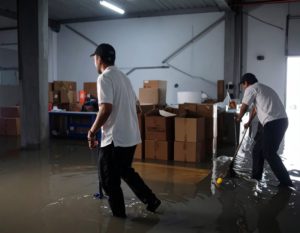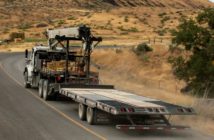Recent flooding has highlighted the need for businesses and organisations to manage risks to make sure working conditions are safe, WorkSafe says

Workers have a right to be kept safe and healthy, whether they are involved in cleaning up or clocking on for a shift. If it’s unsafe, speak up if you feel able to.
It’s a difficult time for many people and kōrero is important – workers should feel safe to raise concerns. Businesses and organisations should listen and do what they can to help, or explain what the plan is if it cannot be fixed straight away.
If you believe you or someone else is at risk of imminent harm you have the right to not do the unsafe work, but you need to let your employer know as soon as possible. You don’t have to restart the work until you believe that you are out of danger.
If you have a concern about unsafe work, notify WorkSafe.
Safety with electricity and gas
Electricity and water is a dangerous combination. There are several things you can do to keep yourself and others safe:
- If you smell gas then vacate the area immediately. From a remote location, call the local gas company or supplier, or call 111 – so the source of the gas can be found and fixed.
- Assume downed power lines are live and keep well away from them.
- If any electrical components (including plugs, sockets and charging equipment) have been wet, they need to be checked by an electrician for safety.
- If your house or workplace has been affected by water, turn the power off at the mains and get an electrician to check things out and disconnect any unsafe wiring before turning the power on again – if that can be done safely.
- If you need to use electrical equipment in a wet area, remember to use a safety switch (RCD) like you would when using appliances outdoors. Keep your hands dry when operating switches or equipment.
- If circuit breakers have tripped, especially safety switches (RCDs), do not reset them until an electrician has checked them, otherwise you risk an electric shock.
- Pay attention to the safety of children, who are much more effected by electric shocks. In the event of an electric shock, no matter how minor, turn off the supply of electricity at the mains and do not turn it on again until it has been checked by an electrician. Keep the person well away from receiving another shock.
- EV chargers should not be used if they have been under water or exposed to water, get an electrician to check it out first.
- Battery powered equipment will not have an electric shock risk, but may pose a fire risk. If batteries have been under water, get them checked by an electrician.
Read more about managing health and safety
Read more about what to do after a flood
Asbestos safety
When homes and other buildings containing asbestos are damaged during floods, the asbestos-containing materials can become eroded, disturbed, broken, or friable. This can cause a health risk to homeowners, property owners, property managers, and the community.
When damaged asbestos-containing materials are wet, they are not as dangerous, but once dry they can cause a risk to health if fibres are released that can become airborne and be inhaled.
If the damaged structure is presumed to be asbestos-containing, a licenced asbestos assessor or licenced asbestos removalist should also be contacted prior to reoccupation.








